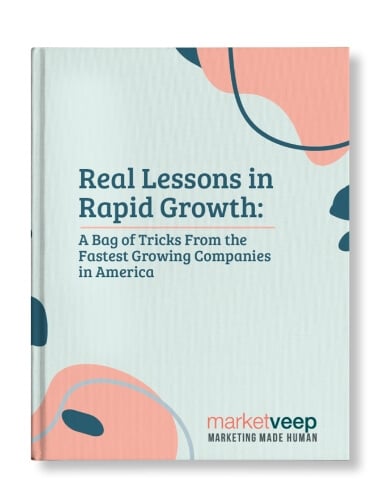What are the Four(4 P's) Elements of the Marketing Mix


By Market Veep
A marketing mix and the multiple “P’s” that go along with it is an important concept to have a firm grasp of if you want to ensure that your marketing efforts achieve peak success rates. But what are the elements of the marketing mix, and how can you make use of them? With this blog post, you can set your business up for success by gaining a clear understanding of a marketing mix, the 4 (or 7) P’s that define it, and the multitude of ways they can help you see real progress in your marketing efforts.
The first step in understanding a marketing mix is learning the definition of it. Now, “marketing mix” is a general phrase, so its exact definition may look different from company to company, but the crux of its meaning remains the same: A marketing mix consists of the various factors a company can control in order to bring the right product to the right consumer at the right time.



Defining a Marketing Mix
Probably the most well-known definition and implementation of the marketing mix comes from E. J. McCarthy, who, in 1960, used the “4Ps” to define what a good marketing mix should consist of. McCarthy’s 4Ps included:
- Product (or service)
- Price
- Place
- Promotion
This understanding of the marketing mix is by far the most well-known and widely used (it’s also pretty old-school), but it’s not the only version out there. In more recent years, the service industry has added their own take on the marketing mix, and have modified McCarthy’s 4P Model into the 7P Model, which includes the original 4Ps and adds 3 new ones, which you can see below:
- People
- Process
- Physical Evidence
With this in mind, let’s start breaking down what each of these Ps mean, how you can use them to define your inbound marketing strategy and prime it for success, and how they help you answer the question what are the elements of the marketing mix.
Product
The product is the actual service or product you are selling. The product should be built to satisfy the needs or desires of a certain group of people — your buyer personas, for example — and can either be a tangible, physical product, or something intangible, such as a service offered.
As always, you want to understand your buyer personas so that the product you’re selling is directed at the right people for the right reasons. For example, a winter sports outfitter isn’t going to want to set up a store in Miami because that audience isn’t likely to respond well to that type of product.
Instead, you’re going to want to make sure that the product you have is properly primed for your target audience’s needs. If you’re not offering the right product to your prospects, then the other factors in your marketing mix won’t do much good.
As you’re deciding on and developing your product, you’ll want to ask yourself some of the following questions:
- What does your buyer persona want from a product or service?
- What features must the product possess in order to satisfy the buyer’s needs?
- When and where will the product be used?
- How will customers experience your product?
- How is your product different from what your competitors are offering?
Depending on your answers to the questions above, you can begin to move into the next level of your marketing mix: setting a price.
Price
Setting a price for your product is one of the most important steps in a solid marketing mix. The price you set for your product will determine the cost that buyers will pay to receive the product, but it will also set the trajectory of your company’s profit margins. When you adjust the price of your products, you’re also affecting the demand and sales of your products, both of which will have a substantial effect on your company.
If you’re offering a new product to the market, then your customers may not be willing to pay a high price, since you’ve yet to prove the value of your product. Even if you’re confident in your product and believe a higher price is still a worthwhile deal, you might need to lower the cost in order to create a positive perception.
If you price your product too low, however, you’ll create the appearance that your product is inferior to those of your competitors. In the same way, too high a cost may lead your customers to decide that the cost outweighs the benefits the product offers. As you price your product, study your competitors and your buyer personas to better understand both the industry you’ll be participating in and the audience you’ll be marketing to.
If you need some further direction, here are some questions you can ask yourself as you price your product:
- How much does the product cost to produce?
- What will the customer’s perceived value of the product be?
- Will a slight price increase or decrease significantly affect your sales margins or market share?
- How does your product’s price compare to those of your competitors?
Place
The “place” in a marketing mix refers to the placement of the sale or product distribution. An effective channel of distribution is one that’s convenient for your customer base to access and should be located in an area that your buyer personas are exposed to.
As always, you’re going to need to understand the ins and outs of your buyers if you hope to get them in the door.
There are a number of distribution strategies you can choose from, but ultimately, your decision should come down to how you answer the following questions about your target audience:
- Where do they usually look for products?
- Are they primarily online shoppers, or do they frequent brick-and-mortar stores?
- Have they purchased from any of your competitors before, and if so, why?
Promotion
The promotion of your product covers all of the efforts your company undertakes in order to improve a product’s visibility to the consumer. Effective promotional campaigns will boost brand recognition, which will then improve your sales. Poor promotion, however, can leave a product adrift at sea, lacking the direction needed to motivate buyers to commit to a purchase.
The best promotional strategies are the ones that take advantage of as many outlets as possible. A healthy mixture of advertisements - on TV, in podcasts, or online - and public relations - press releases, sponsorships, social media, discounts - is usually the best way to attract attention and encourage your audience to tell others about your brand.
For further guidance on promotional strategies, take a look at the questions you should ask yourself below:
- Where and when are you able to showcase your product to the target audience?
- Where does your target audience spend most of their time? The Internet, on TV, listening to the radio or to podcasts?
- What are your competitors doing to promote their products?
Expanding the Definition
While the 4Ps definition of a marketing mix is the most commonly used, there is another approach that expands on McCarthy’s original outline. These aren’t as universal as McCarthy’s definition, but it’s good to be aware of them and how they may affect your marketing strategies.
People
The ‘people’ referenced here do not only refer to your audience and your buyers, but also to everyone directly associated with your company.
When it comes to your customers, you want to have researched them enough to gauge whether they have a need for your product and whether or not their population is substantial enough to support your business model. This is where your buyer personas are necessary. The work you’ve invested in setting those up will really pay off here.
Meanwhile, your employees are also important to take into account, as they’re the ones who directly deliver a product or service to your buyers. It is important that you hire and train people who will be best equipped and qualified to promote and sell your product. The more your employees believe in your business and its products, the better they’ll be at the job, and the better off your company will be.
Process
What kinds of people are involved in the process of producing, marketing, and selling your product? What sort of path does the product go on from inception to its eventual arrival in the hands of the consumer? Are there areas that slow things down? Is your process as streamlined as it can be? If you want to ensure the smooth execution of your service, then you need to invest time in fine-tuning all of the systems and processes that drive your business.
In the past, everything used to be about the price and the quality of the product and service. But these days, anyone can compete on those grounds. Now, the process is more important than ever, as customers are looking not just for quality products and services at a price they can afford, but also for experiences that delight them.
The more you analyze processes like your sales funnel, your distribution network, your supply chain, your payment system, and any customer-facing assets like your website, the better acquainted you’ll be with your buyer’s experience. This then enables you to ensure that everything your buyers' touch runs as smoothly as possible.
Physical Evidence
Even if you’re selling a service online, there’s still going to be physical evidence that pertains to it, and you’re going to want to have that evidence. This physical evidence doesn’t have to be exclusively physical either but can include things like a PDF receipt sent to a customer.
This “physical” evidence is ultimately a tool that you can and should use to gauge how your product is being received. For example, your company’s branding would fall under this definition and could be measured by how familiar audiences are with you and your business.
Brand recognition is one of the most important types of physical evidence you can possess. It gives you an honest look into how well-established your brand is in comparison with your competitors, and can help you plot a trajectory that will further increase the rate of your success.
So, What Are the Elements of the Marketing Mix?
When you take the time to identify and utilize your marketing mix, you’re maximizing the effectiveness of your marketing strategies. Knowledge is power, just like the old saying goes, and the more knowledgeable you are about your audience and the ways your marketing interacts with and affects them the more powerful your brand will be at earning qualified leads and converting them into devoted, excited customers.
Get The Latest From
Market Veep
RELATED ARTICLES

Master Sales Funnel Strategies: Tofu Mofu Bofu!
Between SEO, SEM, and SERPS, we’re always finding clever ways to break down concepts into four...

Why B2B Demand Generation Strategies Work
The sparkly, PR rep cousin of lead generation, this approach is all about growing your audience by...

Key Marketing Strategies for Robotics Manufacturers
In fact, experts project that the U.S. Robotics market is on track to pull in $7.85 billion in 2024...

Get Growing!
Download our eBook and get advice from 8 CEOs of Inc. 5000 companies in their own words.

GREAT MARKETING PARTNER
Market Veep is a great firm that handles all of our marketing efforts. This is the second time that I have used the firm. I highly recommend Market Veep!

Cres F.

EXCEPTIONAL EXPERIENCE
Market Veep's Onboarding Experts in Inbound Marketing are an absolute game-changer! From the get-go, their approach was top-notch. Market Veep's team has undoubtedly set the bar high for excellence in inbound marketing. Five stars aren't enough to commend their outstanding service!

Matthew W.

BEST PARTNER EVER!
As a growing business, setting up our first-ever HubSpot account was a crucial step towards enhancing our marketing and customer management strategies. From the moment we contacted MarketVeep, their team demonstrated professionalism, expertise, and a genuine desire to help us succeed. Overall, our experience with MarketVeep was exceptional, and we couldn't be happier with the results. Thanks to their guidance, we are now utilizing HubSpot to its fullest potential, streamlining our marketing efforts, and nurturing leads more effectively.

Jean M.

SET UP FOR SUCCESS!
We had an exceptional experience with Market Veep! Their team is professional, super organized, and friendly, and I truly enjoyed working with them. They executed on time and made the process super easy with their organization and documentation. In addition, they provided additional guidance and answered my many questions as I was new to HubSpot, and provided documentation resources for future use. We're now set up to leverage all that HubSpot marketing has to offer, and we couldn't have done it without Market Veep's expertise.

Bailey G.

OUTSTANDING WORK
There aren't enough words to describe the outstanding, professional work MarketVeep has provided to our company. From start to finish, the website design/development team at MarketVeep assigned to our project was extremely knowledgable, respectful, efficient and timely. The results went above and beyond our expectations and we could not be more thrilled with the improvements to the user experience on our website! Bravo MarketVeep, we'll absolutely be back with more projects!

Nadine B.

5 STARS FOR MARKET VEEP!
We had a fantastic experience with Market Veep! Their expert team seamlessly guided us through implementing HubSpot and provided comprehensive training across Sales, Service, and Marketing Hubs. Their knowledge and support significantly enhanced our workflow and overall efficiency. Highly recommend Market Veep for top-notch HubSpot solutions!

Anneke C.







